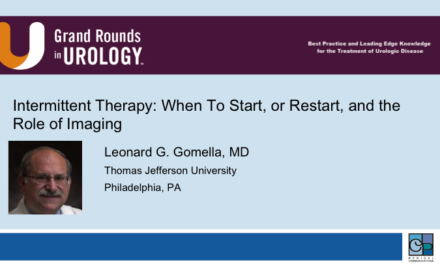John F. Feller, MD, presented “Current and Emerging Role of Radiogenomics in Risk Assessment for Focal Therapy” during the virtual 5th Global Summit on Precision Diagnosis and Treatment of Prostate Cancer in September 2021.
How to cite: Feller, John. “Current and Emerging Role of Radiogenomics in Risk Assessment for Focal Therapy.” September 2021. Accessed Apr 2024. https://grandroundsinurology.com/current-and-emerging-role-of-radiogenomics-in-risk-assessment-for-focal-therapy/
Current and Emerging Role of Radiogenomics in Risk Assessment for Focal Therapy: Summary
John F. Feller, MD, Founding Partner of Desert Medical Imaging, Chief Medical Officer for HALO Diagnostics, Assistant Clinical Professor in the Departments of Radiology at Loma Linda University and at Riverside School of Medicine, and Chief of Radiology and Partner of the American Medical Center in China, discusses the emerging role of radiogenomics in prostate cancer in the context of risk stratification for focal therapy. He explains that he and his colleagues at HALO Diagnostics are interested in finding “Whack-a-Mole” patients whose cancer tends to recur in a way that makes them difficult to manage with focal therapy. Dr. Feller asks whether risk stratification for focal therapy can be done using radiogenomics and whether responders to focal therapy for prostate cancer can prospectively be distinguished from non-responders using biomarkers. He defines responders as those with a negative MR guided biopsy of the treatment site(s) 6 months following focal therapy who do not develop in-field or out-of-field clinically significant recurrences over time. Dr. Feller then lists the biomarkers and other criteria used in risk stratification with radiogenomics, including age, initial serum PSA, initial PSA density, mpMRI, index lesion mpMRI volume, index lesion quantitative ADC, systematic biopsy, Gleason score, tissue-based genomics, liquid biopsy, molecular imaging. He goes into depth about results from the tissue-based genomics PTEN and ERG (ProstaVysion), Decipher for biopsy (Decipher Score), and Decipher GRID. He also further explores liquid biopsy options, including urine (ExoDx) and blood (Biocept). Dr. Feller concludes: that mpMRI followed by genomics and other biomarkers show promise for risk stratification for focal therapy of prostate cancer; that a biomarker ensemble approach to prostate cancer helps mitigate the blind spots of individual biomarkers, as well as the heterogeneity of the disease; that research of radiogenomics in the setting of focal therapy for prostate cancer may help develop novel combination therapies such as focal therapy combined with checkpoint inhibitors; and that multiple biomarker complex data sources present an artificial intelligence/machine learning opportunity.
The Virtual Global Summit on Precision Diagnosis and Treatment of Prostate Cancer brings together key international opinion leaders of every clinical subspecialty involved in patient care. This event is an integral part of the AdMeTech Foundation’s Annual Summit, which was established in 2016 and became seminal in shaping the state of the art and future vision for precision care. The goal of this event is three-fold: 1) Educating the key stakeholders; 2) Supporting a sustained cross-disciplinary dialogue and consensus on the best emerging clinical practices and research priorities; and 3) Expediting clinical adoption of promising novel diagnostics and therapeutics. For more educational activities from this virtual event, visit our collection page.




